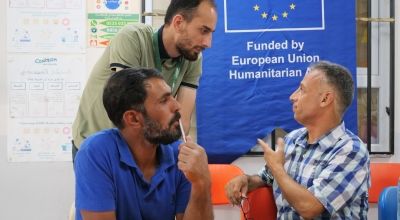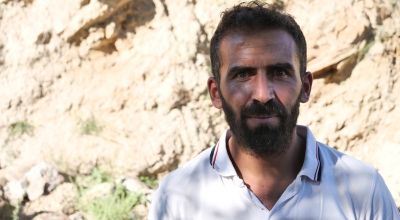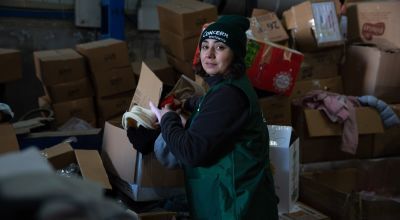
Read our 2023 annual report

Knowledge Hub
Multiple members of their families died in one tragic day. Some sustained serious injuries. Others still live in a "mental state of emergency". Many lost their homes, possessions and livelihoods. These are just a handful of survivors' stories, one year on from the devastating Türkiye-Syria earthquakes.
The world watched in horror as the news emerged that two earthquakes had struck Türkiye and Syria on February 6 last year. More than 50,000 people lost their lives and millions more were affected.
Within hours of the earthquakes, Concern Worldwide and our local partners sprung into action to support those who needed it.
Several of the people we worked with spoke to us recently about how they are coping after a life-changing year.
Erva: "My father dug my family out of the rubble"
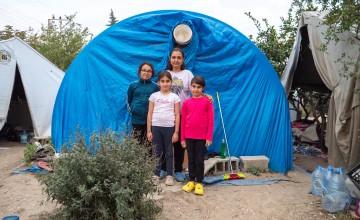
A woman has praised her heroic father, who spent hours risking his own safety to dig his daughter and grandaughters out of the rubble of their home after it collapsed on top of them during the earthquake.
Erva* spent hours under the ruins of her home in Hatay with her four daughters, who were aged between 10 and 17, praying to be rescued. She said: “When I think about the earthquake, I get this feeling in my chest. Before the earthquake, we had a normal daily life, my husband was working, our children were in school and I was doing a hairdressing course.
“It was a typical Sunday evening, everyone was getting ready for work and school the next day. It was the last day of the spring break, so we had gone shopping to get some school supplies, I had packed their bags and they were excited for school the next day.
“Normally I didn’t sleep in the room with the girls but that night I just felt like being close to them. I woke up at quarter to four in the morning because the house was too warm. One of the girls woke up to have a glass of water and I was hoping to fall back to sleep again soon. Normally I sleep very easily but that night I couldn’t. I realised that the cupboards were shaking and I could hear them moving.
"We often experience small earthquakes in Hatay, we are used to it, but that night when I heard the cupboards shaking, I realised this one was different. I tried to wake the girls up, my oldest girl was like, ‘Mom, what are you doing? It's the middle of the night’ and just wanted me to let her be but I insisted that they wake up because I knew it (the earthquake) was different.
“My two older girls woke up but the younger two wouldn’t, I was trying but at that moment, the roof started falling on our heads. We had practiced how to be safe during an earthquake, so the older girls did what they had practiced and since the twins didn't wake up, I just grabbed them and lay with them next to the beds.
At that moment, the whole roof fell on us.
“I couldn’t hear anyone’s voice and I didn’t have a phone or light or anything, the only thing we had was the light on my older daughter’s watch.
“My older girls started screaming, I knew nobody would be able to hear us, so I asked them just try to preserve their energy.
“I was angry with myself because I didn't manage to get the girls out on time but I was thankful that at least we are alive. It was scary, it was in the middle of night, it was raining and it was cold. The earthquake continued and all day it was shaking, big ones and small ones, and towards the afternoon a second earthquake hit that was around the same magnitude. The only thing that I was thinking of was to survive."
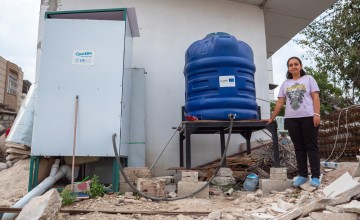
Erva’s family lived on the ground floor of a three-story building, which her parents lived close to.
Erva said: “My neighbours managed to rescue my parents but told them that they thought we must be dead after the whole building had collapsed on us. My father went to the side of the building where the girls’ bedroom used to be and then he started screaming and shouting and thankfully he heard our voices. Then he ran to get some equipment to get us out of there.”
Erva's father Mehmet* then tirelessly set about rescuing Erva and her children.
Mehmet said: “After five hours of digging, I was able to get them out, my daughter and all four of her girls. I started digging with my hands and I didn't even realise that there was shattered glass there, so, I cut all of my hands, but I didn't even realise at that moment that I was bleeding.”
Erva and her daughters thankfully only suffered minor injuries during their ordeal. She says of the moment they were freed: “I was thankful to God when I came out of the rubble but I couldn't think about anything, I was in shock. I only later realised that parts of my body were swollen. I was out of my mind, I don't really remember what I was feeling, I was just thankful to be alive.”
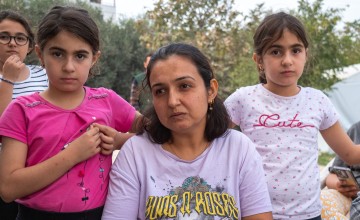
Ten members of the family stayed in a car together for the next 15 days. Erva says of that time: “For the first few days were long, we didn’t eat, we didn’t have anything. Then a few bakeries and shops reopened and started distributing everything they had between everyone equally, so we were able to get bread.
"My parents’ house hadn't collapsed totally, there was a space where we able to see directly into my parents’ wardrobe. It felt like we were thieves in our own house. We would go inside, grab something and just immediately run out again, we did that for days. But after 20 days the house totally collapsed because of the aftershocks.”
There was also no washing facilities so they had to use the rubble as a toilet, which Erva says was “humiliating”.
After their house fully collapsed, Erva, her husband and their children moved to Sinop, a city that was more than 12 hours away by car, to stay with relatives. They were there for four months but came back to Hatay so their daughters could return to school.
Erva’s parents refused to leave their neighbourhood; instead they used a neighbour’s greenhouse to set up a tent for themselves, where they also built a heater.
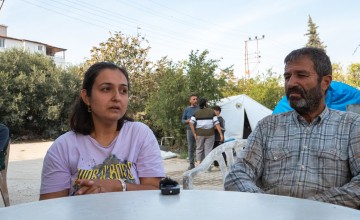
Concern's team met the family last summer and was able to assess their needs and provide a number of essential items, including a water tank, cleaning kits and hygiene kits, which was funded with humanitarian aid from the European Union.
Erva said: “We were shocked when we met the team because no one came here, it’s not in the city centre, it is far away. I started crying because I was so happy."
Erva is keen to rebuild their lives and home, and is now looking towards the future.
She said: “I want to have a normal life, I dream of opening my own hair salon, my husband is working but we need to earn more money so we can rebuild our home.
“We have all been affected psychologically, we are all still afraid. My children haven't slept well since the earthquake. One of my younger daughters still wakes up screaming at night, running towards the door of the tent.
Razia: "I am still in constant fear"
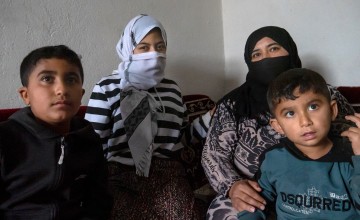
The power of community spirit is what helped one community in Türkiye survive in the aftermath of the earthquakes.
Razia* (35) is a Syrian refugee who moved to Malatya eight years ago after fleeing conflict. She lives alongside her husband, their four children, Razia’s cousin and her two children. The family’s home was badly damaged in the earthquakes, so they are spending another freezing winter in a tent nearby.
She said of the night of the earthquake: “Since we moved to Türkiye, we have lived in that house. I remember the earthquake happening and we left this house when we felt it. We were out in the rain and we didn’t have a tent or anything for two months.
“We use this house as a base when it is rainy and the tent is wet inside, but we know this house is obviously not safe.
“I felt fear, and I am still in constant fear for my children. When they go to school, I am afraid that something is going to happen to them or to myself.
" I feel like I’m still in a state of emergency mentally. I am afraid that anything could happen to anyone at any time."
Forty people from Razia's neighbourhood stayed together in her uncle’s home for two months after the earthquake, when Malatya Yaşam Derneği - one of Concern’s local partners in the area – provided them with tents so each family had some space again.
With funding from the European Union, Concern was able to provide two latrines in the neighbourhood, which are shared between seven families. Razia spoke about how having access to the toilet facilities has been a source of dignity and privacy.
She explained: “Before the latrines were installed, we had to go to the rubble of collapsed buildings for a toilet as there was nowhere else, you didn’t feel safe and you didn’t have any privacy."
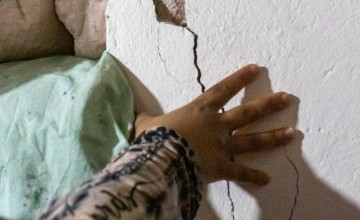
Her husband is working in refuse; he collects papers in exchange for money and he is able to provide for their family’s basic needs, but Razia explains it is not enough to repair their home.
“I don’t want anything, I just want to have a happy and normal life. And the biggest thing that I have is to have a decent home. We need a lot of restoration work done to this home.”
Razia also praised the people in her neighbourhood for the support and love they gave each other in the wake of the earthquakes.
She said: “I really love my community, my friends and my relatives are here. I know that we will all take care of each other's kids and we will make sure that everyone is safe here. It does not feel like we’re separate families, this community feels like a whole family.
“After the earthquake, our community brought each other goods like bread, water and fuel. We could survive after the earthquake because of each other.”
Nadia: "My youngest child was only two months old when the earthquakes hit"

Nadia* should have been enjoying getting to know her then-two-month-old baby when the tragic earthquakes struck last February; instead her family's lives were turned upside down.
Nadia (48) is a mother of 10 living in Malatya. She moved to Türkiye 13 years ago when she fled the conflict in Syria.
They lived in a tent for five years when they first arrived in Türkiye before they were able to find a small house, which was destroyed in the earthquake.
They have managed to find new accommodation in a small old house which withstood the earthquake, but it also sustained a lot of damage during the disaster.
She said: "We just slightly felt the first earthquake. We woke up, but we did not leave the house, because there was one metre of snow outside. Our neighbours were panicking but we decided to stay because we had a lot of children in the house.
"When the second earthquake hit later during the day, the children started panicking, and then we left, we didn’t take anything. The second earthquake damaged the house but it did not collapse. We lived on the street for four days, all the neighbours helped each other.
"It was horrible. Our youngest child was only two months old, and it was so cold. The police came and sealed our house, because it was too dangerous. We were not allowed to enter, not even to use the toilet.
"I was trying to be strong in front of my children but inside, I just felt fear. My skin broke out in a rash, on my hands, neck, everywhere. I was afraid for my children."
After a few days, Nadia's family went to stay with a relative and there were 47 people living in just one room. After 10 days there, they then went to stay with different relatives in another city, but as they are Syrian refugees, their children weren't registered to attend school in that district, so they returned to Malatya so the children could continue their education.
When they returned to Malatya, they found the house where they currently live and they met Concern's local partner, Malatya Yasam Dernegi, and - with funding from the European Union - they were able to provide items including blankets, solar lamps, hygiene kits, baby kits (which include nappies and milk) and fans.
Nadia says of their current situation: "It's an old house, it has problems with the roof. When the rain outside has stopped, the rain inside has not. At the moment, I don’t want anything other than a dry roof over our heads.
"The house is too small. The males of the family are sleeping in one room, and the females in another – so parents and children are not separate. We need a healthy and decent shelter, a home."
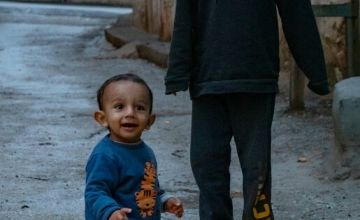
As she contemplates what lies ahead, Nadia says: "I am struggling to get out of the reality I am in, and to just have a wish for the future. The biggest wish I have for my family is that the children finish school. I am afraid I will not be able to provide for them to go to college, I would love for them to go to college, including the girls. My husband wants all the girls to study, to get jobs, and be independent."
Darine: "We lost many family members in the earthquakes"
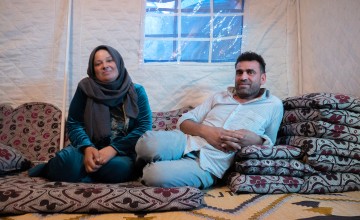
A woman who has survived the Syrian conflict and the earthquakes in Türkiye has said her greatest wish is to go back to a normal life.
Darine* and her family fled their home and moved to Türkiye in 2015 after losing several family members in the conflict. First they lived in Antakya and then they moved to Hatay. Her husband had worked as an Islamic scholar in a mosque in Syria and the family found work collecting rubbish in Türkiye.
They experienced further trauma when the earthquakes struck. Speaking from the tent where they now live, Darine recalls: “We were all at home when the earthquake started, everyone woke up because of it and all the children came to me and we managed to escape. It was heavy rain outside so we were just gathered together under some plastic for shelter.
“I was not afraid, I was just relying on God at the moment and praying. My husband grabbed the heater to bring it outside and I took all the clothes that had been hanging out to dry so that the children would have something warmer to wear. It felt like Judgement Day, everyone was running here and there and I was trying to give clothes to people who had just run out of their houses.
“I used to be a nurse normally, there were four people with broken legs and cut fingers so I was helping with whatever I had, I was not afraid at all, I was peaceful and I just kept praying for everything to end. My husband made a fire and the neighbours gathered around it to keep warm, we told the children to stay together and keep praying.”
Unfortunately, Darine’s husband was badly injured in the earthquake. She explains: “Initially he was told by the doctor that he would need to have his leg amputated from below the knee, he went to another doctor who thankfully said that there was no need and they could save it. It hasn’t fully healed though and he has to take injections every day since then and is also using creams. Thank God he still has his leg."
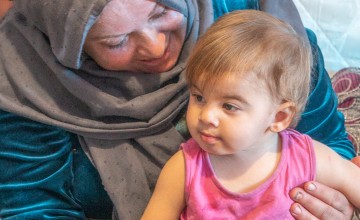
For the first 10 days after the earthquakes, they were living on the street, in a makeshift shelter. They stayed with relatives in a different area temporarily and were given three tents by the Hatay local government when they returned.
They were able to make a homely area by cleaning a space that had been filled with rubbish. They also collected bricks that were strewn on the street from collapsed buildings so that they could make the ground even to pitch their tents on.
For their water source, they dug and found the water piped from destroyed buildings that were still connected to water and they were able to connect those pipes. Darine told how she also had to cut up fabric and use plastic to make nappies for her baby.
Concern has been able to support the family by providing items like a large water tank and a toilet chair, which were funded by the European Union.
Speaking of the past few months, she said: “We suffered from hunger, we suffered from heat, we suffered from cold and we have suffered from a lack of space, but at least we are here.”
Tragically, Darine lost some of her loved ones in the earthquakes, saying: “Many of our family members died, one of my brothers lost all of his children and his wife. Another of my brothers lost two of his children and his wife lost an arm.
“I cannot compare the conflict with the earthquake. The earthquake felt very easy on us in comparison because it was not human made. The ones who died, they died. And then the ones who survived, survived. We can continue our lives from here on.”
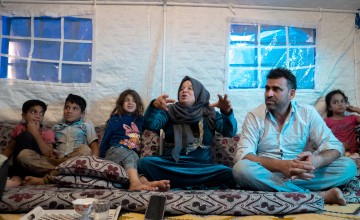
She stressed that her life has not always been so precarious, and she wishes that they could go back to how things were before the conflict in Syria began.
She said: “We have been working as garbage collectors since before the earthquake, collecting items like plastic and metals, which can be reused and recycled. We can get a decent amount of money out of it, but because of my husband’s leg we need to pay for a lot of things - the injections, disinfectant to keep the wound clean.
“We live day-to-day, if we work that day then we have money to eat, depending on how much garbage we can collect, which is useful but we definitely need more money to buy the medicine that he needs daily."
When asked what she hopes for their futures, she said: "I will work like I will live forever. At the moment, my poor son only goes to school one day and the next day he can’t because he has to go work to collect garbage to provide for the family for the day, and I'm not happy with it, I want my children to go to school every day.
"I want a proper house, where there is a space for everything and everything is organised and clean. I would love a car and a home and a decent life for myself and the children. You’re seeing us like this, but this is not how our lives used to be. Living in the camp is not easy, for example, yesterday we had to remove a snake from inside of the tent, so it is dangerous. If we had a wish, we would go back to normal life.”
Our impact in 2023
people reached through our emergency response
people reached through our health interventions
people reached through our livelihoods programmes


